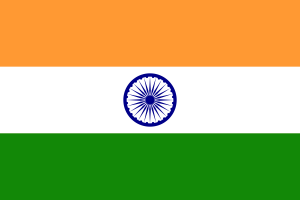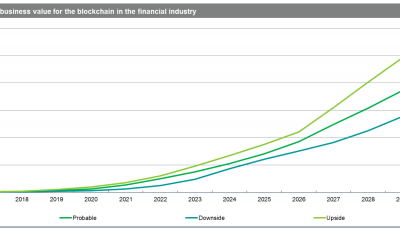[Guest Post] Why India Needs a Native Blockchain Protocol
by Ausaf Ahmad, CEO of Eleven01
How can India benefit from Blockchain and the maximization of a native blockchain protocol?

The national flag of India
The world’s largest democracy is marching towards digitization. Ever since the finance minister of the country spoke about the blockchain technology in his budget speech in March 2018, the distributed ledger technology has found itself to be the center of attention among industry leaders and governments alike.
Because of its immutability, blockchain has been attracting the attention of governments all over the world. These government departments see valuable opportunities through this technology. With the transparency and the authenticity that the blockchain brings, it is getting easier for participants to keep a check on the validity of data that is being presented to them.
In India, it appears that the government, unwilling to encourage cryptocurrencies and ICOs, is interested in leveraging the blockchain. In July 2018, the state of Rajasthan became the first in the country to have a fully developed blockchain-based fabric for managing electronic health records. This news came following the Kerala state government’s attempt at incorporating blockchain in the purchase and distribution network of vegetables, milk, and fish in the state.
There is definitely a strong interest in employing blockchain from the government. However, India is not alone in this journey. Several other countries have already started using the blockchain in governance and citizen-facing applications.
Global vs India
From a global standpoint, some initiatives that have truly stood out are as follows –
- The government of Dubai has set a rather bold example by attempting to put their entire governance on the blockchain.
- The National Energy Commission in Chile is employing blockchain to bring accountability to the department.
- Estonia is using technology to create blockchain-based e-resident programmes.
- The United Kingdom is paying for welfare payment and student loans through the blockchain.
- Singapore’s finance department is using the blockchain for interbank payments.
The one thing that stands out here is that most countries that have successfully implemented blockchain PoCs have small populations and the applications implemented here do not have as much of need for speed and scale.
That changes when it comes to India. With over 1.3 billion people, every service that will employ the blockchain will have high speed and scale requirements. Furthermore, India’s internet infrastructure, though vast, is not consistent across its geography. Majority of India’s mobile computing devices are also on the lower end of the spectrum.
This is changing as we speak, but if blockchain is to address India’s problem now, customized base chains are a necessity.
How can India benefit from blockchain?
The Indian government has been keen on exploring the potential of blockchain in its governance domain with strong support coming from the honorable Prime Minister himself. The NITI Aayog is backing the government’s interest at the adoption and advocacy of the technology.
For the sixth largest economy of the world, the blockchain technology currently offers a plethora of opportunities spread across many sectors. There are numerous underlying problems in the Indian systems that the blockchain technology can eliminate. These pertain to areas of banking and finance, agriculture, education, employment, healthcare, voting, supply chain, retail, and even Goods and Services Tax (GST).
With the blockchain technology, we can create a distributed database for potentially any of the use cases mentioned above, and more, and work at eliminating the problems from the ground root.
For instance, the Indian healthcare industry lacks a robust infrastructure to securely store large amounts of data. It is one of the largest sectors with revenues expected to touch Rs. 8.6 trillion or 120 billion USD by 2020. The government is constantly building initiatives to improve the healthcare facilities provided to the citizens. An industry of this scale comes with huge data repositories hosting sensitive information about patients.
A distributed database gives us an opportunity to store all of the patients’ data securely and efficiently. With blockchain, different medical organizations and individuals such as doctors, labs, hospitals, etc. can request access to a patient’s data to gain a more holistic understanding of the patient’s case history and pre-existing conditions. For instance, the state government of Rajasthan, India is attempting to do exactly this.
The blockchain technology would also make it easier to implement multiple government initiatives efficiently from the beginning. For instance, The Ayushman Bharat initiative, announced by the government of India in 2018, aims to have a far-reaching impact on the Indian healthcare landscape by incorporating IT enablement, data analytics and management of fraud, among other things, in healthcare. It aims at providing efficient healthcare facilities to more than 10 crore rural and urban families. With assistance from the blockchain, the implementation of the biggest government-sponsored healthcare scheme in the world especially w.r.t to fraud management can be successfully achieved.
The same goes for the education sector where it is getting harder by the day to differentiate fake degrees from the real ones. In January 2018, Delhi police busted a fake degree racket operation which had sold more than 50,000 forged mark sheets of both school and university levels.
The state medical council of Maharashtra, in September 2018, pressed charges against 58 doctors for submitting fake degrees to obtain a practising license.
In scenarios like these, a digital certificate based on the blockchain wherein the degrees are issued on a distributed ledger with a complete auditable trail visible to all stakeholders helps eliminate any fraud possibility.
The blockchain technology also helps us in cases of EVM (electronic voting machines) tampering and allows us to keep voter’s information and identity secured using cryptography.
The blockchain technology has also been employed to bring a change in cross-border payments (with faster transactions and minimal fees), supply chain management (with more transparency and enhanced security), and real estate (with shorter sales cycles and overhead costs).
It is also useful in the much complex Good and Service Tax calculation where the nodes in a supply chain can calculate the GST suitably making for an incorruptible system.
Today, the blockchain technology is a key aspect of governance digitalization owing to the transparency that it brings into the system. Multiple to citizen services (farmer subsidy, PM Aavaz Yojna, Ayushman Bharat) can be delivered efficiently to the beneficiaries because of the inherent benefits this technology brings with itself.
In ideal government machinery, the blockchain technology eradicates the scope of corruption and provides for an efficient system while enabling ease of doing business.
The NITI Aayog is highly supportive of the blockchain technology. As quoted by the CEO Mr. Amitabh Kant, “NITI Aayog is applying Blockchain technology to pressing problems of India in areas such as land registry, health records, fertiliser subsidy distribution system, the menace of fraudulent drugs, agriculture supply chain. These disruptive projects will bring immense productive efficiency.”
Blockchain enabling an interoperable ecosystem
The blockchain technology will create a single shared ledger containing untampered data which everyone will be able to access. This would not only enable communication between different data repositories but also a uniformity in their storage and security infrastructure.
The blockchain implementation will potentially establish a connection between all the domains of the government and will ensure efficiency, transparency, and improved governance.
A native, homegrown protocol – Eleven01
New use cases for blockchain are being developed every day. This is because most countries have access to a blockchain protocol that has been developed and bred in their native technologies (China has NEO; Korea Icon etc). But there has been no native blockchain protocol on which the government, industries and startups can build their various use cases on top. The established projects in India find it difficult to transition from their traditional legacy trade processes to the novel blockchain protocol. As for the emerging blockchain projects, it becomes difficult to negotiate the same.
With local requirements for data sovereignty, privacy and security in mind The Eleven01 Foundation is developing India’s first ever home-grown blockchain protocol to enable the smooth progression and adoption of the blockchain technology across the country.
A major domain where India can make use of blockchain is the data storage and privacy issues. The country took a step towards having its own data privacy framework after Srikrishna Committee made several recommendations relating a data protection law. India has nearly 600 million internet users and it only makes sense for the country to have a framework that can protect their data from being exploited. Blockchain can potentially be of assistance here with its novel storage solutions changing the way data is stored wherein users get to decide who accesses their data.
A country as vast as India needs a protocol that has been developed by someone who understands the Indian customers and the Indian system of doing things—a protocol that accommodates the Indian diversity and establishes a country-wide blockchain ledger which can act as an accelerator in bringing the government initiatives closer to the people.
The Eleven01 Protocol
The Eleven01 protocol is India’s one solution to look at blockchain aggressively. It will be developed taking into consideration India’s needs and thus provides an infrastructure to build fast, scalable, and distributed ledgers securely storing data and enabling improved operations.
In addition to addressing the issues of privacy and scalability, Eleven01 attempts at solving the problems of having to build entire databases from the ground up.
The Eleven01 protocol will be developed with oracles which make it possible to transfer critical existing data onto the blockchain while keeping the rest off-chain thus not clogging the overall speed of the system. And that’s not the only interesting thing about the protocol. The Eleven01 protocol is a flexible protocol where the privacy settings can be altered and consensus algorithm can be chosen depending on the type of use case being worked on.
These are exciting times for the blockchain technology and its applications and it is high time for India to look at blockchain aggressively and benefit from everything this transformation technology has to offer. Now with a blockchain protocol that has been developed and grown in the country, opportunities for India have increased to play a major role in this global movement. The future of blockchain looks bright and this is India’s time to take a leap.
![[Guest Post] Why India Needs a Native Blockchain Protocol](https://coinreport.net/wp-content/uploads/2019/02/Ausaf-Ahmad.jpg)
Eleven01 CEO Ausaf Ahmad
Ahmad graduated MBA from MIT Sloan. He takes responsibility for Technology Advisor (Nucleus Vision) and led airplane propulsion integration group at Boeing Company. Ahmad is also the founder of the Azure Blockchain Council and former Microsoft Blockchain and IoT Lead.

![[Guest Post] Breaking Down Barriers with The Next Generation of DApps](https://coinreport.net/wp-content/uploads/2019/06/Jimmy-Zhong-CEO-of-IOST-400x230.jpg)










